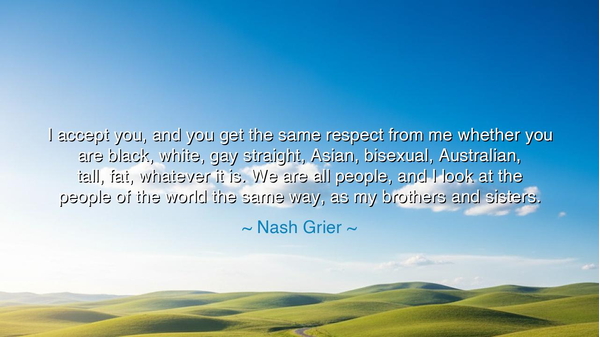
I accept you, and you get the same respect from me whether you
I accept you, and you get the same respect from me whether you are black, white, gay straight, Asian, bisexual, Australian, tall, fat, whatever it is. We are all people, and I look at the people of the world the same way, as my brothers and sisters.






Hearken, O seekers of harmony and bearers of conscience, to the words of Nash Grier, who proclaimed: “I accept you, and you get the same respect from me whether you are black, white, gay, straight, Asian, bisexual, Australian, tall, fat, whatever it is. We are all people, and I look at the people of the world the same way, as my brothers and sisters.” Within this humble declaration dwells an eternal truth: that the measure of a person is not in the color of their skin, the shape of their body, nor the name of their nation, but in their shared humanity. In these words, Grier touches the ancient principle that underlies all virtue—the sacred unity of mankind, born of the same breath and destined for the same dust.
From the earliest dawn of civilization, sages have spoken of the bond that ties all human souls together. In the East, Confucius taught the way of ren—the cultivation of human-heartedness, the recognition that compassion must extend beyond self and tribe. In the West, the Stoics proclaimed the brotherhood of all people under the same heavens, declaring that virtue makes no distinction of race or birth. Nash Grier’s words, though uttered in the modern age, flow from the same timeless spring: the conviction that to respect another is to honor the divine image reflected within them.
Consider the story of Mahatma Gandhi, who walked among the poorest of India, seeing no difference between the untouchable and the noble, the Hindu and the Muslim, the colonized and the conqueror. His reverence for all people, rooted in the recognition of shared dignity, became the weapon by which he overthrew empires—not with violence, but with compassion. Through his life we see that respect, when truly practiced, carries power greater than armies, for it transforms enemies into neighbors and strangers into kin.
Yet Grier’s statement carries an even subtler wisdom. To accept others as brothers and sisters requires not blindness, but vision—a heart capable of seeing beyond difference. It is easy to honor those who resemble us; it is the mark of maturity to respect those who do not. When he says, “I accept you,” he speaks not of shallow tolerance, but of an active, conscious embrace—the choice to acknowledge the equal worth of every soul. Such a choice, repeated daily, becomes the foundation of peace in every home, workplace, and nation.
The ancients warned that division arises when pride clouds perception. The philosopher Seneca wrote, “We are waves of the same sea, leaves of the same tree, flowers of the same garden.” So too must modern humanity awaken from the illusion of separateness. Prejudice, cruelty, and indifference are but the sicknesses of a world that has forgotten its shared soul. Grier’s words are thus not mere sentiment—they are a summons to awareness, a reminder that only through respect can civilization endure.
The lesson is luminous: respect is the seed from which unity grows. When you honor another, you affirm your own humanity. When you demean or diminish, you wound not only them, but yourself. True class, as Grier says, lies not in wealth, fame, or refinement, but in how one treats others—especially those who stand apart. The person who respects all, from the mighty to the meek, lives in accordance with the highest law of the universe: the law of love.
Practical action flows from this wisdom: greet every person you meet with kindness; listen before judging; extend compassion even where none is returned. Celebrate difference as the tapestry of creation. In your words and deeds, let respect become a daily practice—an offering of peace to a world starving for dignity.
O seeker of understanding, remember this: though humanity wears many faces, it shares one heart. Let the words of Nash Grier echo within you—“We are all brothers and sisters.” Walk through life with eyes unclouded by prejudice and a heart unshaken by division. For in recognizing the sacred in every person, you awaken the divine within yourself, and thus fulfill the oldest and noblest commandment of all: to love one another.






AAdministratorAdministrator
Welcome, honored guests. Please leave a comment, we will respond soon